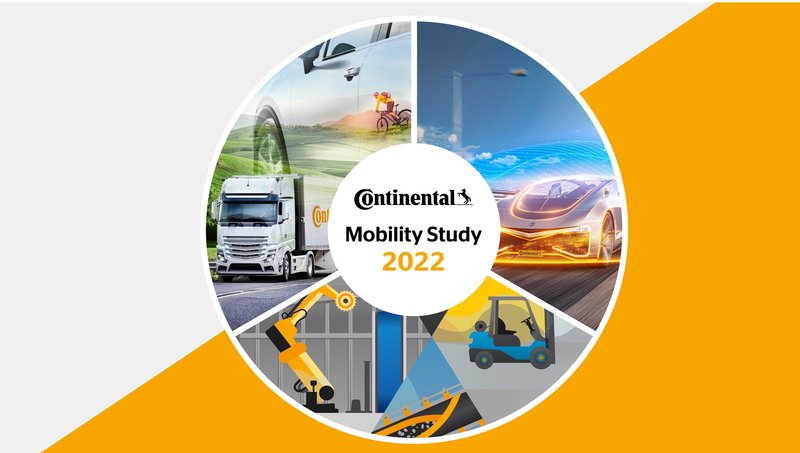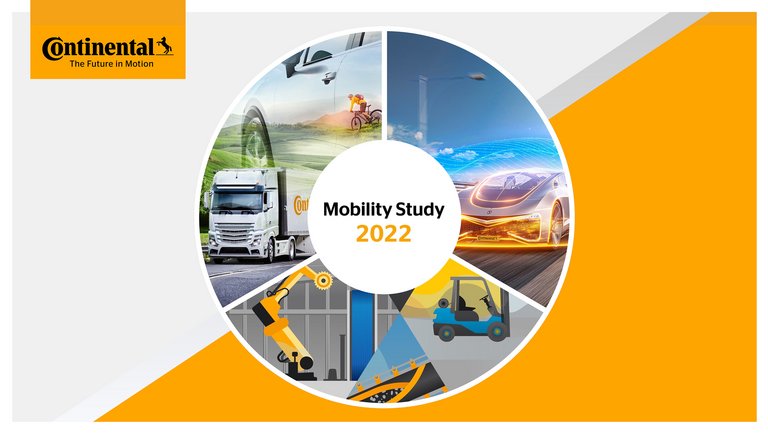High Energy Prices: People Are Worried about the Affordability of Their Mobility
- Latest Continental Mobility Study: Over 70 percent of all respondents are worried about the affordability of mobility
- In Germany: Most people will no longer be able to afford to drive if gasoline costs more than €2.80 per liter
- Sustainability is gaining in relevance. But the majority of people do not want to pay the higher prices that this entails – rather, they want the government to take care of this
- CEO Nikolai Setzer: “The findings of this year’s study show: Mobility must remain affordable”
- Cars are set to remain the most important form of mobility, even after the pandemic subsides
Hanover, June 30, 2022. People are increasingly worried about the affordability of their mobility. This is one of the key findings of the Mobility Study 2022, published today by Continental. Generally high inflation rates and above all the rapid rise in energy prices are threatening to put the brakes on the transformation of mobility in Germany. Sustainability, specifically in relation to cars, is becoming increasingly relevant to a majority of German citizens. In accordance with this, only 44 percent of Germans surveyed expect the future of mobility to be electric. For a narrow majority of people in Germany, however, environmentally friendly mobility is not currently viewed as a priority against the backdrop of high electricity, gasoline and diesel fuel prices. In addition, more than half of those surveyed in Germany will no longer be able to afford to drive if the price of gasoline exceeds €2.80 per liter. Cost is on people’s minds when it comes to switching to climate-friendly mobility as well: half of the respondents are not prepared to spend more on an environmentally friendly vehicle than on a conventional one. At the same time, almost half (43 percent) indicate the high costs as a reason against specifically purchasing an electric vehicle. In the opinion of a vast majority, governments should therefore do more – through subsidies, for instance – to ensure a rise in the proportion of emission-free vehicles and, above all, to ensure that mobility remains affordable overall. It is the duty of policymakers to create the framework conditions required to achieve this – these expectations are made quite clear by those who took part in the mobility study. “For over a decade now, the mobility study has been an important barometer for the global development of mobility trends and the acceptance of new technologies,” says Continental CEO Nikolai Setzer. “The findings of the latest study show that people worldwide want driving to be safer, more convenient and also more sustainable. But first and foremost, it must remain affordable.”
Continental conducted the representative mobility study together with renowned market research company infas for the seventh time. In May 2022, infas surveyed 6,000 citizens aged between 18 and 70 across Germany, France, Norway, the US, Japan and China, on their personal mobility requirements and their travel and leisure behavior.
Soaring electricity costs and a lack of information as barriers to electric mobility
The study determined that costs and still-inadequate infrastructure are barriers to higher demand for environmentally friendly mobility – particularly for electric mobility. Some two thirds of the survey respondents in Germany feel insufficiently informed about what it costs to buy and run an electric car. Due to the soaring electricity costs, 67 percent are unsure about purchasing an electric vehicle. Overall, a majority (62 percent) therefore do not feel that they will be able to afford an electric vehicle in the near future.
The majority of respondents, however, do see it as important or even very important that the materials used for their car are environmentally friendly and sustainable, and also that social standards and human rights are upheld during production and along the entire supply chain. At the same time, the majority of respondents are not prepared to pay a premium for reused or recycled materials in their vehicles. The same applies to the use of fuels obtained through renewable energy such as green hydrogen.
People would like to see more financial aid and regulation provided by the government
Generally, the vast majority of respondents (73 percent) are worried that mobility is no longer – or will no longer remain – affordable for them due to the rise in energy costs. Therefore, more than four out of five respondents (82 percent) think it is up to the government to ensure that mobility remains affordable. Moreover, 77 percent see it as the responsibility of the government to ensure that environmentally friendly mobility becomes less expensive than environmentally harmful concepts. The results for Norway, which was included in the mobility study for the first time, show that the government can adopt an active steering role. In Norway, the government promotes the purchase of electrically powered cars through a number of tax incentives and specific information campaigns. By doing so, the Norwegian government is supporting the market penetration of electric drives, which is also reflected in the results of the study: among the respondents here, the share of electric or hybrid vehicles (26 percent) is higher than that seen in the five other countries surveyed. However, in Norway, as in other European countries, a lot still needs to be done with regard to sustainable drive concepts. The proportion of vehicles with diesel engines was 41 percent in Norway, which is consistently referred to as a pioneer in electric mobility, while the figure in France was 46 percent.
“The Mobility Study 2022 shows that people are in favor of the transformation toward low-emission or emission-free mobility that has begun and are prepared to take that route as well,” explains Steffen Schwartz-Höfler, head of Sustainability at Continental, regarding the findings. “At the same time, however, the results of this year’s Continental Mobility Study worldwide show that private consumers are unwilling to bear the financial burden of this mobility transformation alone. If this project is therefore to succeed at the necessary pace, the new forms of sustainable mobility must be affordable. Only then will they be positively received.”
Cars are the big winner in the pandemic – and are set to remain the most important form of mobility
The Continental Mobility Study 2022 clearly reveals that cars are the big winner in the pandemic – and are set to remain the most important means of mobility in its wake. The vast majority of respondents reported using their car at least once a week. In the US, more than half (59 percent) even use theirs every day. Only around a fifth of respondents use public transport at least once a week, and only one in ten use it daily. The decisive factor here according to the study is that cars will maintain their prominent position in the future, and may even expand it. A vast majority of those who reported having traveled during the pandemic asserted in the survey that they intend to continue either using their car just as much (84 percent) or even more (60 percent) once the pandemic is over.
Cars are an increasingly important part of people’s personal living space
A majority of people in Germany define the car as an essential part of their mobility and their personal living space. Here, there is a strong desire to have the latest technologies in their vehicle. A majority, for example, would like their car to be connected to the internet in order to download the latest software as well as traffic and environmental information. Half of the respondents see electronic assistance systems as desirable or even as necessary basic equipment. One in four would like functions such as automated driving during traffic jams.
Here again, however, people have reservations. They are worried about potentially uncontrollable consequences resulting from the use of technology – for example, not only that errors in the software could impair the functionality or safety of the car, but also that technology could make cars too complex to operate. However, the majority also think that automated driving can prevent accidents. “The general trend revealed by the study is that cars themselves, as well as the technology built into them, must remain intuitive to operate, safe and affordable,” says Gilles Mabire, chief technology officer, Continental Automotive. “The majority of respondents indicated that connectivity, automation and the user experience play a decisive role when purchasing a new vehicle. Comfort and convenience functions therefore become key factors in customers’ purchasing decisions. We believe that, with our new Automotive strategy, we are well positioned and prepared for the challenges of the future.”
The Continental Mobility Study 2022
Since 2011, technology company Continental has carried out the Continental Mobility Study on various key topics at regular intervals. For the 2022 edition, together with the market and social research institute infas, Continental surveyed a total of 6,000 people over the age of 18 across Germany, France, Norway, the US, Japan and China in May 2022 on their personal mobility requirements. In each country, the respective sample is representative of the population; for China, it is representative of the urban population. The aim of the Continental Mobility Study, now in its seventh edition, is to provide an international comparison of people’s attitudes toward current and future developments in mobility and their personal usage habits. The topics covered in this year’s mobility study include general mobility needs, attitudes toward sustainability aspects, particularly in terms of electric mobility, as well as economic and technological developments related to cars. Against the backdrop of the coronavirus pandemic, a particular focus of the study was on the role of cars as a possible sanctuary and place of retreat in connection with travel and vacations.






